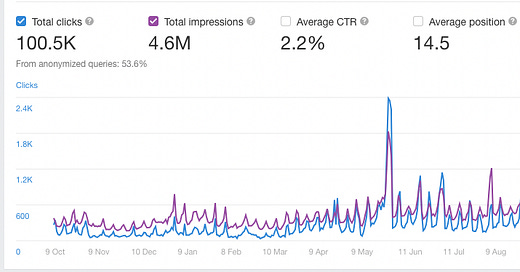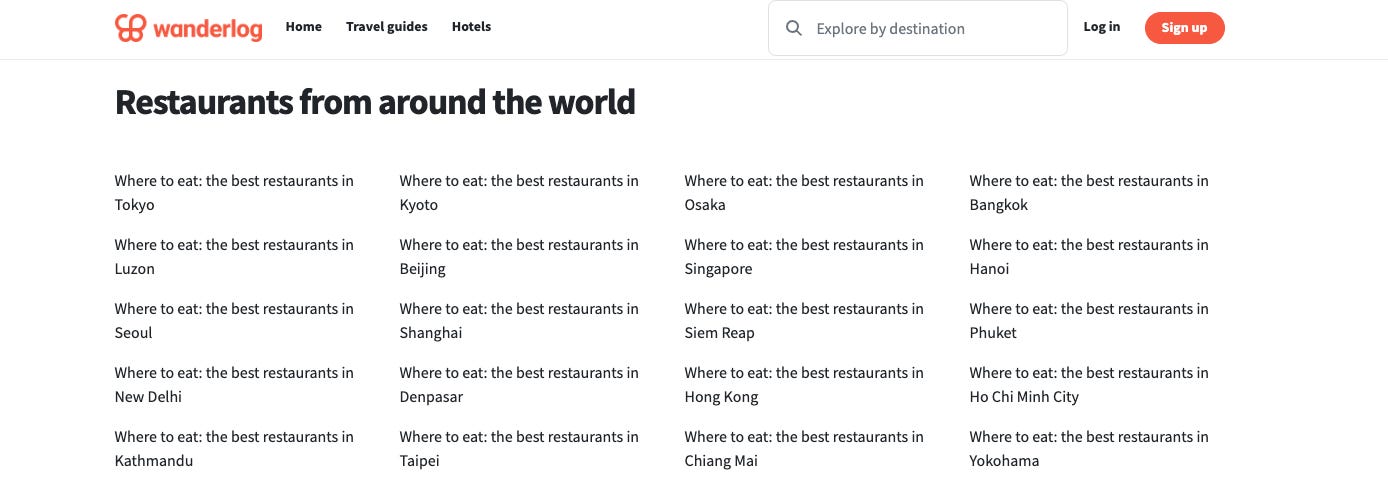Lessons from reaching our first million users through SEO
You don't need to hire an SEO expert to reach your first million users. For founders with technical skills, there's a much better way to get there.
In my journey as a founder, I've built close to half a dozen products, most of which have failed. The difference between the products that failed and the ones that succeeded was never something interesting like the scalability of our tech stack or the viral marketing schemes we came up with; it was always due to distribution or lack thereof.
For most founders (especially B2B SaaS founders), SEO is an enormous distribution advantage, but unfortunately, it's pretty unexciting work. This is partly due to the fact that "SEO Expertise" has been made to feel like it requires a Ph.D., and the large number of SEO Marketers who have convinced thousands of smart people that only they can lead you to success and if you "mess it up", your website's reputation may be forever tainted by the gods at Google. Before I dived into the bread basket of SEO, I truthfully considered paying for an expert myself, but I'm glad I didn't, and hopefully you'll see why you likely shouldn't as you read on.
Please note, as I just mentioned, I am not an SEO Expert.
The 80/20 for understanding SEO
The Pareto Principle or the 80/20 rule states that 80% of your results come from 20% of your work, and nowhere is this more valid than SEO. The general gist is that you want to rank on Google for high-intent queries that your ideal customers are making in relation to your product. That way these users discover your product, and some percentage of them convert into paying customers. Most founders understand this; the hard part is usually creating content and getting backlinks, which are the crucial elements to ranking for your search term.
You can and should compete against the big players
Many founders give up on SEO almost immediately due to the high domain ranking and backlink authority of their competitors; this is generally a mistake. We attained our results with a DR ranking of 10 on Ahrefs while most of our competitors had much higher rankings. You do not need to grow your DR strength to 60 or 70 to start attracting users, but you do need to find a way to stand out from the herd.
Also, just pay for an SEO SaaS. Products like Ahrefs and SEMrush et al. are some of the most expensive products a small startup can buy in the early days, but there is a reason these companies can offer such high prices across the board; they work. I did not want to pay $100 dollars a month for Ahrefs at the time, so I found some cheap knockoff that was 10x worse and essentially wasted a month of my time. Just do it. If you're serious about growth, it will pay for itself 10x over. You should also know that SEO is a long-term play. It should not be your immediate plan to grow, which is why you always start before you feel the need to.
The product we were working on at the time was an event app, so we had fierce competition from Eventbrite, Dice, and all of the other large ticketing companies. After doing some competitive analysis, we realized that Eventbrite's system was one of the most sophisticated in the world and we couldn't compete by trying to outrank them, but we saw that for our target demographic their system was lacking, so we decided to focus there.
There are only two ways to rank, and one is better than the other for technical founders
You either need to write blogs or create engaging dynamic content if you want people to find you through SEO. If you've been keeping an ear to the SEO world for any amount of time, you've likely read somewhere that you should write blogs to get your initial set of users. This is generally great advice for most business owners, but founders who are technical or have access to a technical co-founder have what I'd consider a better option — dynamic content. We initially started out by trying to write blogs in our SEO journey, but writing well is very time-consuming and slow.
Given that I understood that SEO would not start showing results for months, I wanted to invest as little time as possible into it and focus more on immediate marketing goals. The results we achieved were done almost exclusively with dynamic content. Dynamic content is essentially a webpage that uses a templated system to create multiple entries that can focus on different search terms.
Create aggregated dynamic content based on your unique data that speaks to your customers
You might be thinking that my description of dynamic content feels vague, and you'd be right. The general idea here is you create one page, which is powered by a single data source. This means you can create another data source and now you have two pages. If you create 100 unique data sources, you now have 100 pages. This is where the technical piece comes in and enables you to really create powerful content that speaks to your users. For our event app, we realized that our users were young people living in cities who were mainly looking for unique and urban types of events. From talking to these users and being our own app users, we realized there was an opportunity to annotate our events in a way that our ideal users would be more interested to click our link versus Eventbrite's.
So we scanned all of our data and annotated everything. We then created dynamic SEO pages for each event and each city, but we didn't stop there. We realized there were certain genres of events our community really enjoyed, so we introduced new columns in our events table to represent these data points. We also used the type of language that resonated with our audience, and the results showed that it worked. Even when Eventbrite was higher ranked than us, our ideal users still clicked our link and downloaded our app.
An example SEO page might have a title in the format:
Top {tag_name} events in {city_name} for {community}You can see the large number of long-tail keywords such a templated system can provide and the beauty of having one page that can scale to 10,000 keywords.
A great examples of this is Wanderlog, which has some of the best SEO templating I've seen in some time.
I built an agent that can help you figure out your dynamic content strategy
Since setting up a good dynamic content strategy can lead to huge gains for certain companies, figuring out your unique IP and how to annotate it properly is extremely important. That's why I created an AI agent that can offer advice based on your product. Feel free to give it a try, and I hope it leads to some wins for you.
Overall, SEO became a huge part of our product, and after seeing the impact it had, I believe that every founder, especially technical founders, should learn how to leverage it to grow their products and reach more of their customers.
Thanks for reading. I'll see you next time :)






These are great tips, Victor. I'm definitely going to give dynamic content a shot for my SaaS in the file transfer space.